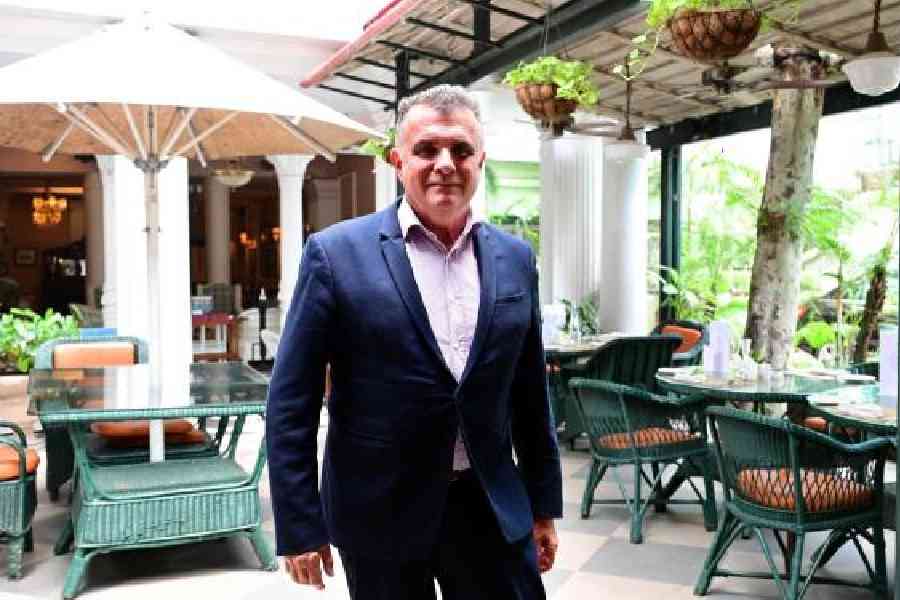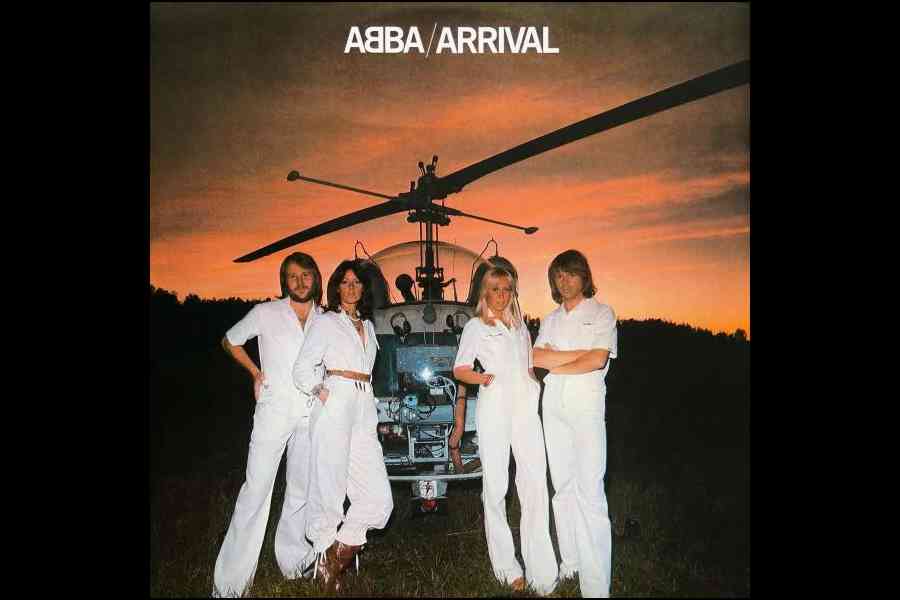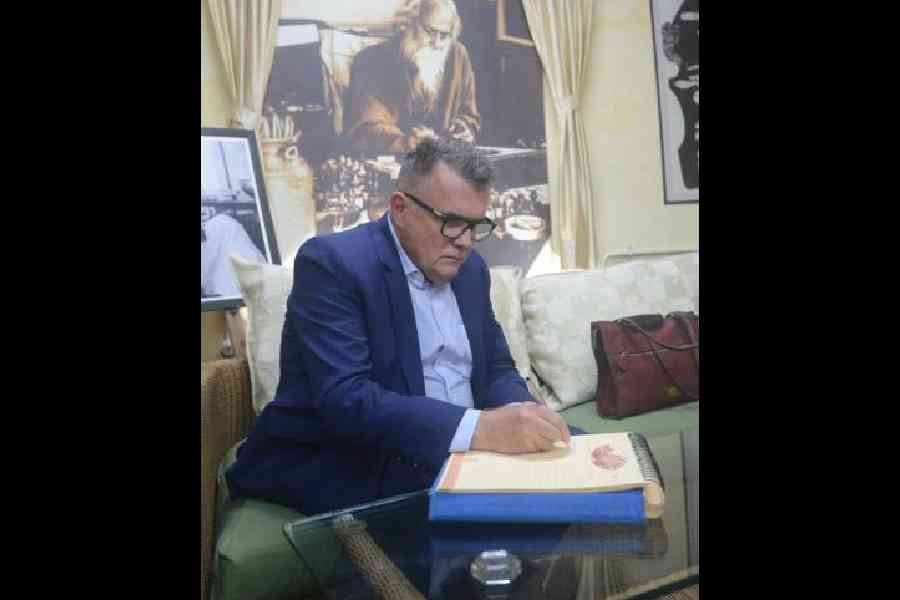Time passes very quickly in this country because there is so much happening,” the ambassador of Sweden Jan Thesleff reflected, looking out at Sudder Street. On his maiden trip to Calcutta, he was ensconced at the Elgin Fairlawn, an 18th-century building cradling a 19th-century hotel. The senior diplomat, who came to attend the Sweden-India Nobel Memorial Quiz, spoke to t2 about Rabindranath Tagore and the Nobel Prize, Swedish technological innovations and global brands with Swedish roots.
Have you been to Calcutta before?
This is my first visit. I am attending the Sweden-India Nobel Memorial Quiz (at Presidency University). There are 180 teams registered. We started this quiz in 2008. We’ve had them all over India. This year, we are starting in Calcutta and we will have it in six cities.
Was Calcutta there from the start?
The quiz was held in Calcutta for five years at a stretch, from 2014 to 2018. Now it has returned in 2024.
Calcutta has a great quizzing culture, both open quiz and in educational institutions. Which is this?
This quiz is for college students. The grand final happens in Delhi. The team that wins is sent on a week-long trip to Sweden. They get to visit the Nobel Museum, universities as also companies because this quiz is supported by Swedish companies in India. They receive them when they come to Sweden. This is a way to attract young Indian talent to open their eyes to Sweden.
For higher studies or generally to Sweden, as a country?
Sweden as a country but also for postgraduate studies. I was very impressed by the finalists. They know much more about my country than I do! I got 60-70 per cent right but they got 100 per cent. They were very impressive not only with the answers but also the way they spoke and presented themselves — very professional and mature.
You mentioned Swedish companies being involved with this quiz, which brings to mind the big Swedish brand Ikea. In 2019, they had reportedly sought an appointment with the Bengal chief minister seeking to open two stores here. Are they coming here?
The first retail store they set up in India was in 2018 in Hyderabad. The story of Ikea goes back to 1943 when it was founded. In the ’60s, they had an international expansion and they started sourcing goods from India in 1986. They were sourcing textiles, carpets, metalwork, decorative items not only for the Indian market but for the global market. This is the biggest house furnishing store in the world. Recently I was at the ground-breaking ceremony for their retail store in Noida, which will open in 2028. Before that, they will have another store opening in Gurgaon in 2026. Online sale will start in 2025. They are also having multi-function spaces with offices, hotels, shopping malls, plus an Ikea store. So more of a complex — that’s the new concept that they are rolling out in India. I don’t know their plans in Bengal but they are very ambitious for India.
How many Swedish companies are operating here?
Every month there are two Swedish companies establishing themselves in the Indian market. So now we have 280 companies. There were 240 when I came to India. So we have had a steady expansion.
Forty new companies in two years? Not bad!
The big companies are already here like Ericsson, ABB, Astra Zeneca... Spotify is Swedish, so is Truecaller. The mid-sized niche companies are also coming. I had a meeting with a Swedish company called Centersource (Technologies). They provide computer-based solutions that are developed and marketed out of Calcutta. They help other companies keep track of their supply chain. They have offices in Sweden and elsewhere. That’s an example of smaller companies operating here.
What is the status of your honorary consulate in Calcutta?
For many years, Babi (Ranajit) Nobis was representing us. Sadly he passed away this spring. Now we are waiting for a new appointment for that post. We have been present here for a very long time. We get a lot of visa requests from Calcutta. A lot of Indian students, including from Calcutta, are going to Swedish universities. We have 44,000 Schengen visa applications from India every year. There are 65,000 Indians living in Sweden, which is 0.7 per cent of our population.
Isn’t it one of the biggest immigrant communities, along with the Chinese?
Yeah, and they both work and study. Many of them go for postgraduate studies.
Which subjects do they usually go for?
They go for engineering subjects, IT…. We are trying to get more Indian students in life science subjects like biochemistry, where we are a leading country, and environmental science and sustainability. Many of those who go for graduate studies stay on and find a job. We also have 70 Indian companies established in Sweden. So they can look for a job either with a Swedish company or an Indian company after they finish their studies.
You visited the Tagore Museum at Jorasanko.
Tagore is a very important bridge between India and Sweden as also between Calcutta and Sweden. He was the first non-European to win the Nobel in literature in 1913. Though that was 111 years ago, the imprint of Tagore is very strong. We have a Tagore choir singing his poems. On the 100th anniversary of him being granted the Nobel Prize, his statue was installed at Uppsala University, which is our oldest university. I want to see if there can be a more extensive cooperation with the Tagore Museum.

Ambassador of Sweden Jan Thesleff at The Elgin Fairlawn Pabitra Das
Is the Tagore choir still in operation?
Yes, they continue. They perform in Sweden and also globally.
Tagore had been to Sweden twice, in 1921 and 1926. The centenary of the first visit was during the pandemic. Any plans of celebrating the latter?
For us, the biggest event was the centenary of him being awarded the Nobel. It’s interesting how his literary works spread so quickly. The ones that were first translated into Swedish were the poems in The Gardener and the Crescent Moon. They had seemed revolutionary and had such an impact that they were discovered by the Nobel Academy. That was a very prolific time — the end of the 19th century and the beginning of the 20th century — with many major writers both in America and Europe. But somehow Tagore stood out in a way that has lasted. The knowledge and cultural links through Tagore are very strong.
You have chosen a heritage hotel (Elgin Fairlawn) to put up in.
I love this hotel. It is not just the décor. I love the whole atmosphere of the place. Its history goes back centuries. Sometimes they renovate heritage hotels in such a way that they look modern. I’m so happy that here they have kept the atmosphere. If I were a filmmaker, I would consider using this for a film set as this is such an authentic place.
You are staying in a part of the city dating back to the British era.
Here you get the impression from the prevalence of old buildings that the heritage has survived. It’s probably one city in India, specifically in this area, where things have been kept without being torn down and replaced by steel and glass. This is an architectural gem.
You should take a tour of the Dalhousie Square area…

An ABBA album cover
I am very interested in architecture. Our embassy in Delhi was inaugurated in 1959. It’s a pure example of Swedish 1950’s architecture. Such architecture is now very much in fashion again.
Talking of Tagore, a cultural icon that still rules the retro music charts is ABBA. Have they remained popular in Sweden also?
Absolutely. We are celebrating 50 years of their breakthrough with their first hit song in the UK that brought them to the world stage (Waterloo, a single that reached the top of the UK singles chart in May 1974). They are now in their 70s. There have been several movies with their music, called the Mama Mia! movies, and their musical is still on in London. I think it will run forever. Their popularity soared after they stopped singing. The last time they appeared on stage together was in 1982. Yet they are selling more albums and streaming more songs on sites like Spotify than ever before. They have somehow endured. There have never been scandals in their names. Abba songs have even been used in Hindi.
Another cultural phenomenon is Stieg Larsson’s The Girl with the Dragon Tattoo.
He is the biggest name in Swedish crime stories and the first to conquer the international arena. His books have sold millions and been translated into many languages. Many others have followed him. He passed away quite early after writing his trilogy. They have been made into movies and TV series…. When I was flying in from Delhi, a gentleman was reading the book. This literature, though different from Tagore, has also endured somehow.

